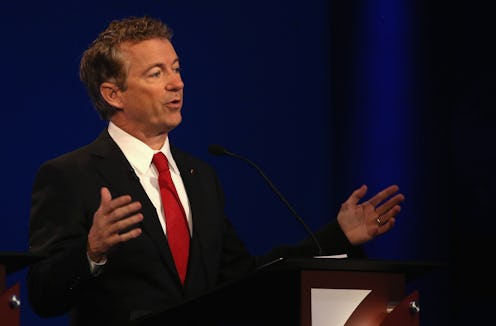News
Rand Paul Didn't Back Down In Fourth Debate
Kentucky Sen. Rand Paul got so passionate while talking about economic policy and the military during the fourth GOP debate that his pen became Twitter famous because he was waving it so fervently. Whether it was the pen or his points, Paul performed well in the fourth GOP debate, forcefully standing by his stance as one of the only Republican candidates against increased military intervention. Though Paul wasn't polling well before the debate, his performance could help improve his stance among the Republican candidates, something he desperately needs.
Paul is an interesting Republican candidate because he identifies with a lot of libertarian ideas, which often emphasize less government involvement and less government spending. This libertarian alignment is part of what made Paul stand out Tuesday. For example, Paul and Florida Sen. Marco Rubio went head to head in one of the longest exchanges of the debate over military spending. Rubio wanted to increase military spending and advocated for a flat tax, but Paul called him out on these policies, saying both of them would only bury the U.S. further in debt. "This is the most important question we are going to talk about tonight: Can you be a conservative and be liberal on military spending?" Paul asked, according to Vice.
And the question made total sense. Twitter users said that Paul's exchange with Rubio was his strongest piece of debate action since the start of his campaign. And Paul's winning quotes for the night only continued to get better and better.
Moderator Neil Cavuto asked Paul about his tax plan — to give everyone a 14.5 percent fair and flat tax. Cavuto asked Paul if his plan to "choke off the amount of money coming into Washington" could land him in a budget crisis at the beginning of his hypothetical presidency, according to the The Washington Post. Paul's answer was pretty great.
I think what's important about the tax debate is, is that we have to ask the question, where is money best spent, in the private sector or in the government sector? I want a government really, really small, so small you can barely see it. So I want lower taxes and much more money in the private sector.
The "so small you can barely see it" part, not surprisingly, generated some pretty great responses on Twitter.
If you put the common arguments against a flat rate tax code aside, Paul's answer showed how comfortable he was in the fourth GOP debate. He later went on to embarrass Donald Trump when Trump was asked about the Trans-Pacific Partnership. Trump said, "Almost everybody takes advantage of the United States. China in particular, because they're so good. It's the number one abuser of this country. And if you look at the way they take advantage, it's through currency manipulation. It's not even discussed in the almost 6,000-page agreement..." according to Vox.
Paul jumped in quickly and fact-checked Trump for moderator Gerard Baker:
Hey, Gerard, you know, we might want to point out China is not part of this deal.
There were laughs among the crowd, and Baker simply responded, "True, it's true."
Another one of Paul's notable moments happened when he was discussing interventionist military policy. He staunchly opposes sending arms to rebels in Syria or other countries with the hopes that it will help them regain power over terrorist groups, according to his campaign website. So, when he was asked what his strategy would be if he wouldn't respond in a no-fly zone strategy, Paul simply said, "The first thing I would do is I wouldn't arm our enemies. I wouldn't arm ISIS," according to a video Paul tweeted.
Paul's simplistic approach to policies seemed to resonate better during the fourth debate. He stuck to his guns, and, though it made him stand out as the singular libertarian on the stage, it also helped his ideas seem clear and well-developed. There was a strong consensus on Twitter that Paul was one of the better contenders in the fourth debate. And that should help Paul stay afloat until the next primary showdown in December.
